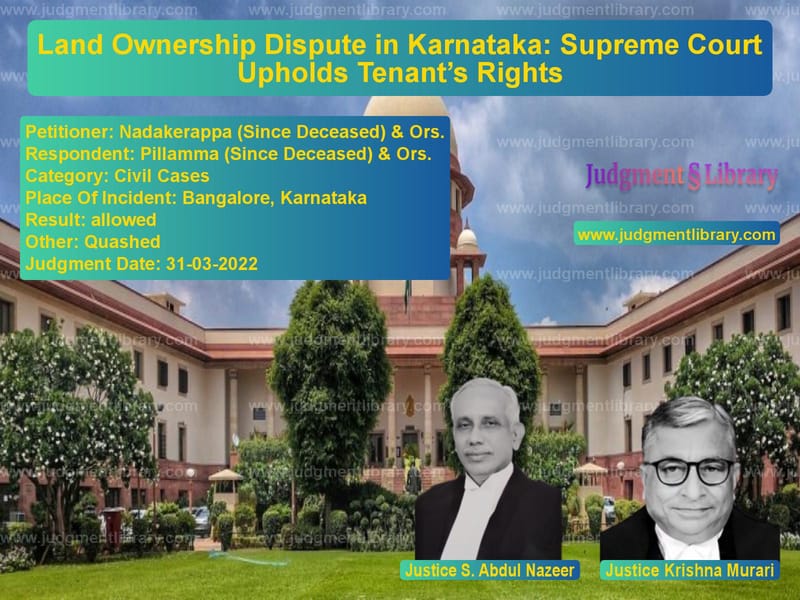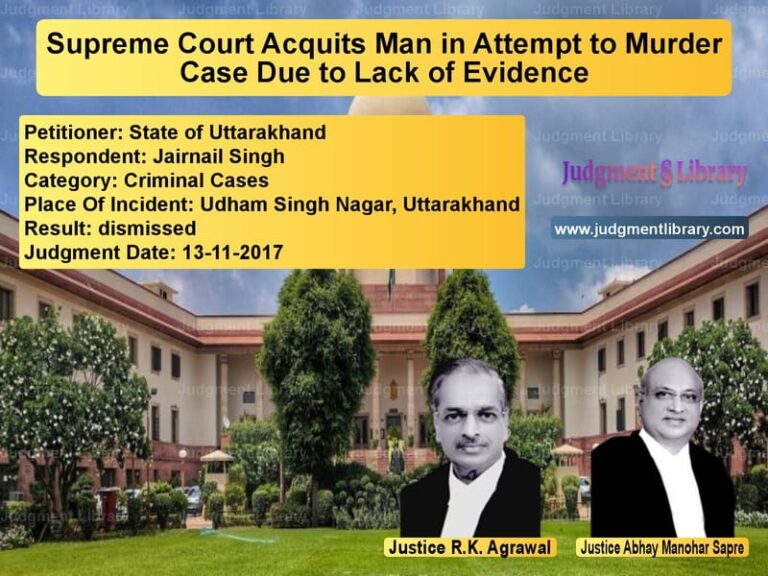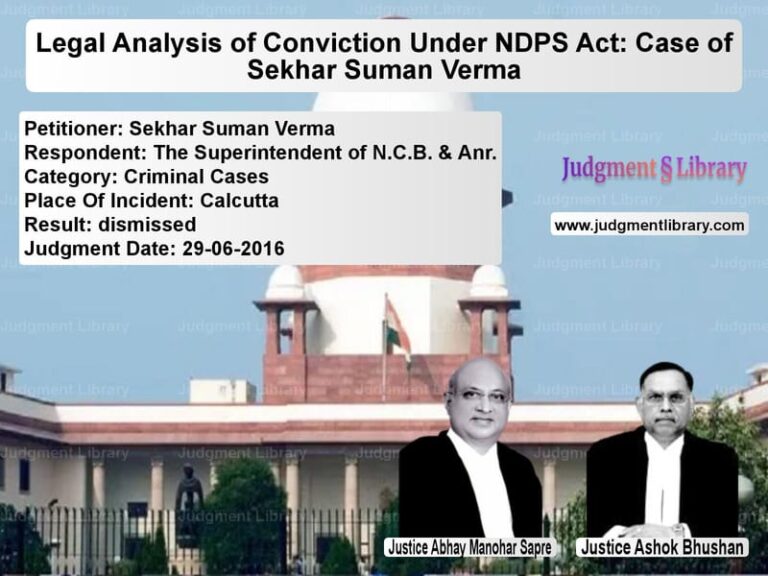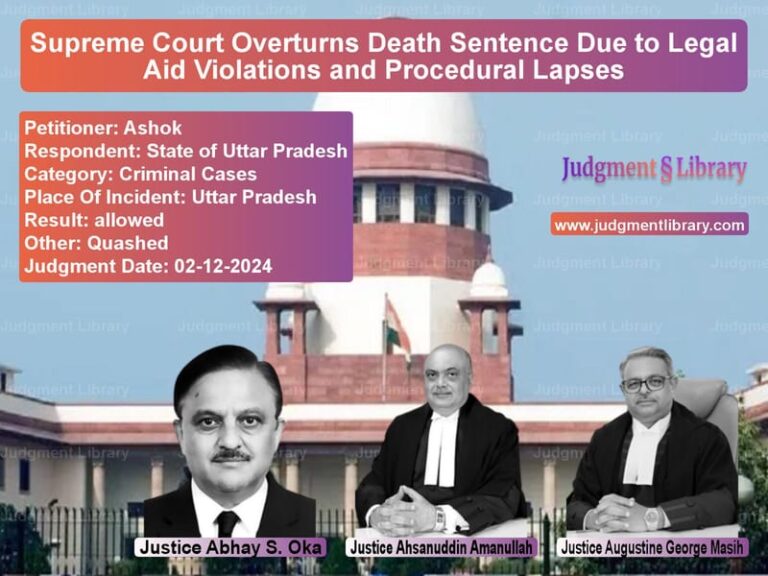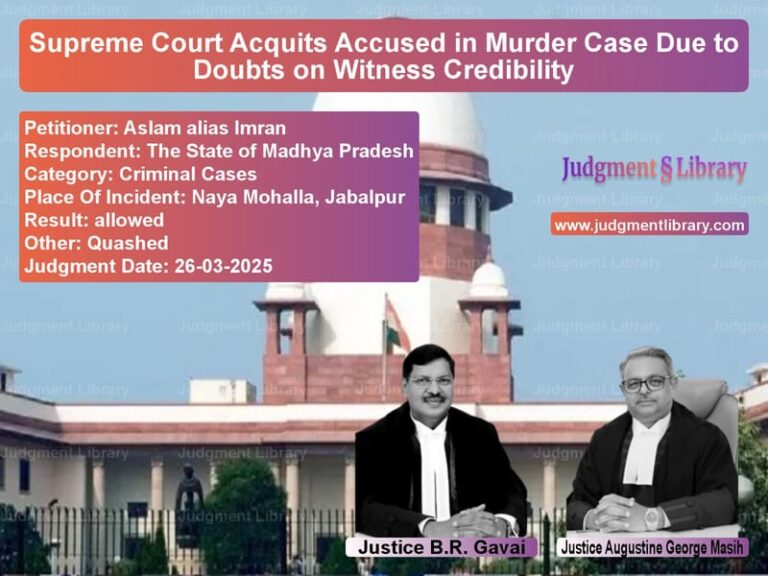Land Ownership Dispute in Karnataka: Supreme Court Upholds Tenant’s Rights
The case of Nadakerappa (Since Deceased) & Ors. vs. Pillamma (Since Deceased) & Ors. involves a decades-long legal battle over land ownership and tenancy rights in Karnataka. The dispute centered around the grant of occupancy rights under the Karnataka Land Reforms Act, 1961, and whether a tenant had fraudulently obtained land rights. The Supreme Court, after reviewing extensive legal history, ruled in favor of the tenant, restoring the decision of the Karnataka Land Tribunal.
This judgment establishes important precedents regarding land tenancy, delay in legal challenges, and procedural correctness in land reform cases.
Background of the Case
The land in question is located in Srigandadakaval Village, Bangalore North Taluk. The original owner, Venkatappa, sold the land to Mariyappa through a sale deed dated August 30, 1954. However, Venkatappa also sold the same land to another person, Sharabaradhya, in July 1954, leading to a conflicting chain of ownership.
Nadakerappa, claiming to be a tenant of the land, applied for occupancy rights under the Karnataka Land Reforms Act, 1961. The Land Tribunal granted occupancy rights to him on April 30, 1982, issuing a registration certificate. However, the landowners challenged this grant.
The legal battle continued for decades, with various appeals and writ petitions filed by both parties. The matter was eventually brought before the Supreme Court after the Karnataka High Court ruled against Nadakerappa.
Arguments of the Petitioner (Nadakerappa’s Legal Representatives)
The appellants, represented by Senior Advocate A.N. Venugopal Gowda, argued:
- The Land Tribunal’s order was passed legally and should not have been disturbed.
- The claimants had waited over 20 years before challenging the grant of occupancy rights.
- Even the landowner, Mariyappa, had accepted the Land Tribunal’s order and did not challenge it during his lifetime.
- The High Court wrongly remanded the case to the Land Tribunal without justification.
Arguments of the Respondents (Landowners)
The landowners, represented by Senior Advocates Vikas Singh and Kiran Suri, argued:
- Nadakerappa had fraudulently obtained occupancy rights by not disclosing the true ownership details.
- The Land Tribunal failed to consider key documents proving their ownership.
- The delay in challenging the grant was due to financial constraints and other legal proceedings.
- The High Court was correct in ordering a fresh inquiry into the land dispute.
Supreme Court’s Observations
The Supreme Court, comprising Justices S. Abdul Nazeer and Krishna Murari, reviewed the case and found significant issues in the High Court’s ruling.
The Court made the following key observations:
- Long delay weakens claims: The respondents waited over 20 years to challenge the Land Tribunal’s order, which was unjustified.
- Ownership documents were not concealed: The Court found that Nadakerappa’s occupancy claim was supported by legal documentation.
- Tenant’s rights under the Karnataka Land Reforms Act: The Court reinforced that tenants who had cultivated land for over 12 years were protected under the law.
- Remanding the case was unnecessary: The High Court erred in sending the case back for reconsideration when there was no fresh evidence.
Supreme Court’s Verdict
On March 31, 2022, the Supreme Court ruled:
- The High Court’s decision to set aside the Land Tribunal’s order was incorrect.
- The Land Tribunal’s grant of occupancy rights to Nadakerappa was restored.
- The landowners’ long delay in filing the challenge weakened their claims.
- The case should not have been remanded for reconsideration.
The Court concluded:
“The Division Bench, without assigning any cogent reasons, has set aside the order of the learned Single Judge and has remanded the matter to the Land Tribunal. It is settled law that the order of remand cannot be passed as a matter of course.”
Conclusion
This ruling reinforces key principles in land tenancy cases:
- Timeliness in legal challenges: Long delays in challenging occupancy rights can weaken a case.
- Protection of tenants: The Karnataka Land Reforms Act ensures that longstanding tenants have secure rights.
- Judicial efficiency: Courts should not order unnecessary remands when no new evidence is presented.
The Supreme Court’s decision upholds the rights of tenants while ensuring legal stability in land reform cases.
Petitioner Name: Nadakerappa (Since Deceased) & Ors..Respondent Name: Pillamma (Since Deceased) & Ors..Judgment By: Justice S. Abdul Nazeer, Justice Krishna Murari.Place Of Incident: Bangalore, Karnataka.Judgment Date: 31-03-2022.
Don’t miss out on the full details! Download the complete judgment in PDF format below and gain valuable insights instantly!
Download Judgment: nadakerappa-(since-d-vs-pillamma-(since-dece-supreme-court-of-india-judgment-dated-31-03-2022.pdf
Directly Download Judgment: Directly download this Judgment
See all petitions in Property Disputes
See all petitions in Landlord-Tenant Disputes
See all petitions in Succession and Wills
See all petitions in Specific Performance
See all petitions in Judgment by S. Abdul Nazeer
See all petitions in Judgment by Krishna Murari
See all petitions in allowed
See all petitions in Quashed
See all petitions in supreme court of India judgments March 2022
See all petitions in 2022 judgments
See all posts in Civil Cases Category
See all allowed petitions in Civil Cases Category
See all Dismissed petitions in Civil Cases Category
See all partially allowed petitions in Civil Cases Category

